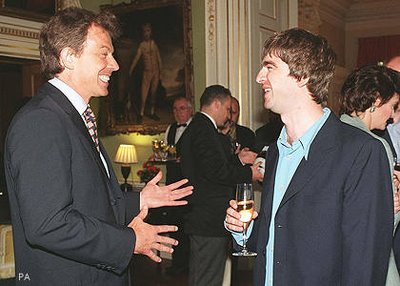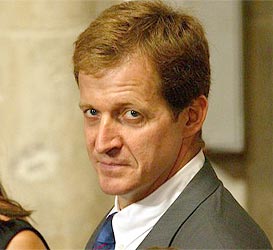The Blair Years part two.
There's very little point in writing an extended review (except I seem to have done anyway. Hurr.) of the second part of the Blair Years, a documentary so lacking in any real rigour that if anything it leaves you with less insight that that which you had prior to sitting through its vainglorious hour-length.
If there was to be a part of the series that made an effort to be critical, this would have been the one. Evaluating the inexorable march to war in Iraq, so many different mistakes were made that you could compare them to the photographs we've grown used to over the last few years of bodies littering the ground, wrapped ready for burial, surrounded by weeping relatives and friends. The errors and lies of the period are similarly tossed aside on the ground, but Blair and his acolytes from the time are most certainly not crying. Jeremy Greenstock, our man at the UN who attempted to write a book about his experiences only to be blocked by Downing Street, more or less admitted straight out that he had lied along with the rest of the government about Jacques Chirac's interview where he said that France would vote no, used endlessly to justify abandoning the attempt at a second resolution, but seemed to have little to no regrets about his mendacity and its consequences.
So many of the issues were skirted over or simply ignored, the things you wanted to ask Blair about, but which David Aaronovitch would never have considered embarrassing his ally with. There was then no agreement to invade Iraq whatever the consequences from talks with President Bush, despite the evidence to the contrary in the Downing Street memos. Blair most certainly didn't mislead parliament, let alone lie. He now thinks that they should have published the JIC briefing document in full rather than let Alastair Campbell sex it up, as if that would have made any difference. The "sexing up" itself didn't make up any sort of imposition on the proceedings, Blair giving it the only mention when he disingenuously said the Hutton inquiry had been setup for the reason of investigating the way the intelligence had been presented. Dr David Kelly it seems has been airbrushed from the historical record, or at least this one.
Like the previous installment, the only real new information was implanted by the talking heads, in this case Bill Clinton, Kofi Annan and Dubya himself. Clinton, who had his own previous completely unjustified face off with Saddam when the pressure over Monica Lewinsky was getting too great, appears to have tried to persuade Blair to see the true face of the Bush administration, but to no avail, probably because Blair had long already thrown his lot in with them. Annan rightly simply couldn't understand how Blair had got himself caught up in the whole mess, and how the tyrannical nature of the "special relationship" led to us being tethered to the biggest foreign policy disaster of recent times. Bush enhanced slightly our knowledge of how America offered Blair a way out, the well-known Rumsfeld press conference where he said that the US could do it alone apparently based on the conversations where Bush had made it clear to Blair that it wasn't worth losing his government over, with Blair's stubbornness declining the offer. Perhaps it was for the best: we might still be stuck with the bastard if he had taken it.
Most overwhelming though was the burning moral certainty that still lies behind both Blair and Bush's war. The number of times that Blair referenced either "the struggle", or "what we're fighting", or the notions of good and bad, at one point even evil, descending into open caricature, only making clear that Blair still very much believes in what he did. Aaronovitch as gently as possible poked him with the piles of bodies, quoting "75,000 Iraqi dead by the most conservative estimate", lest he dare acknowledge in the face of the former leader the more much likely higher toll, yet even in the face of torrents of blood his belief never wavered. As for the planning, it wasn't that there wasn't any, it was that "they" had dared to resist that was the cause of all the problems, rather than the chaos and corruption of the first year of occupation that was the catalyst for it.
As the world divides into ever more shades of grey, to Blair and Bush the landscape is still only black and white. Hilariously, Bush even dared to mention in his justification for the carnage unleashed that America was fighting for human rights. Even now, Guantanamo Bay, Abu Ghraib, extraordinary rendition and Fallujah are all things that the United States is fighting against, even as it perpetuates them. If Blair had wanted the Blair Years to try and put the record straight, or to show him in a different light, it has so far been a failure of the most crushing kind, with the second show casting him back into his most accomplished role, that of the ever faithful poodle.
If there was to be a part of the series that made an effort to be critical, this would have been the one. Evaluating the inexorable march to war in Iraq, so many different mistakes were made that you could compare them to the photographs we've grown used to over the last few years of bodies littering the ground, wrapped ready for burial, surrounded by weeping relatives and friends. The errors and lies of the period are similarly tossed aside on the ground, but Blair and his acolytes from the time are most certainly not crying. Jeremy Greenstock, our man at the UN who attempted to write a book about his experiences only to be blocked by Downing Street, more or less admitted straight out that he had lied along with the rest of the government about Jacques Chirac's interview where he said that France would vote no, used endlessly to justify abandoning the attempt at a second resolution, but seemed to have little to no regrets about his mendacity and its consequences.
So many of the issues were skirted over or simply ignored, the things you wanted to ask Blair about, but which David Aaronovitch would never have considered embarrassing his ally with. There was then no agreement to invade Iraq whatever the consequences from talks with President Bush, despite the evidence to the contrary in the Downing Street memos. Blair most certainly didn't mislead parliament, let alone lie. He now thinks that they should have published the JIC briefing document in full rather than let Alastair Campbell sex it up, as if that would have made any difference. The "sexing up" itself didn't make up any sort of imposition on the proceedings, Blair giving it the only mention when he disingenuously said the Hutton inquiry had been setup for the reason of investigating the way the intelligence had been presented. Dr David Kelly it seems has been airbrushed from the historical record, or at least this one.
Like the previous installment, the only real new information was implanted by the talking heads, in this case Bill Clinton, Kofi Annan and Dubya himself. Clinton, who had his own previous completely unjustified face off with Saddam when the pressure over Monica Lewinsky was getting too great, appears to have tried to persuade Blair to see the true face of the Bush administration, but to no avail, probably because Blair had long already thrown his lot in with them. Annan rightly simply couldn't understand how Blair had got himself caught up in the whole mess, and how the tyrannical nature of the "special relationship" led to us being tethered to the biggest foreign policy disaster of recent times. Bush enhanced slightly our knowledge of how America offered Blair a way out, the well-known Rumsfeld press conference where he said that the US could do it alone apparently based on the conversations where Bush had made it clear to Blair that it wasn't worth losing his government over, with Blair's stubbornness declining the offer. Perhaps it was for the best: we might still be stuck with the bastard if he had taken it.
Most overwhelming though was the burning moral certainty that still lies behind both Blair and Bush's war. The number of times that Blair referenced either "the struggle", or "what we're fighting", or the notions of good and bad, at one point even evil, descending into open caricature, only making clear that Blair still very much believes in what he did. Aaronovitch as gently as possible poked him with the piles of bodies, quoting "75,000 Iraqi dead by the most conservative estimate", lest he dare acknowledge in the face of the former leader the more much likely higher toll, yet even in the face of torrents of blood his belief never wavered. As for the planning, it wasn't that there wasn't any, it was that "they" had dared to resist that was the cause of all the problems, rather than the chaos and corruption of the first year of occupation that was the catalyst for it.
As the world divides into ever more shades of grey, to Blair and Bush the landscape is still only black and white. Hilariously, Bush even dared to mention in his justification for the carnage unleashed that America was fighting for human rights. Even now, Guantanamo Bay, Abu Ghraib, extraordinary rendition and Fallujah are all things that the United States is fighting against, even as it perpetuates them. If Blair had wanted the Blair Years to try and put the record straight, or to show him in a different light, it has so far been a failure of the most crushing kind, with the second show casting him back into his most accomplished role, that of the ever faithful poodle.
Labels: BBC, Iraq, Iraq disaster, The Blair Years, Tony Blair



